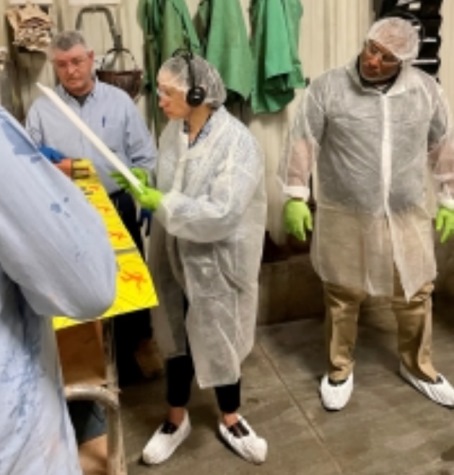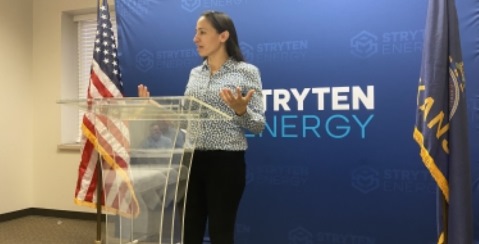

U.S. Rep. Sharice Davids, D-3rd Dist., recently visited Stryten Energy, a manufacturer of advanced battery technology, as part of her Made in Kansas tour to promote domestic manufacturing and supply chain solutions.
The company has a location in the Fairfax area of Kansas City, Kansas.
Stryten Energy produces batteries and energy storage solutions that power everything from warehouses and distribution centers to cars, trains and trucks. Rep. Davids joined Stryten employees last Friday to discuss her work to support innovation and manufacturing workforce in Kansas, and to hear how their clean energy storage technology facilitates the supply chains and drives innovation.
“Over the last week on our Made in Kansas tour, we’ve seen the innovative manufacturing happening right here in the 3rd District. Stryten is a great example of the energy and supply chain solutions we should continue to grow here at home,” Rep. Davids said in a news release. “Manufacturing jobs have consistently moved overseas to countries like China over the last 20 years, especially advanced materials like the batteries that Stryten produces. We need to invest in these industries if we want to compete globally and lower costs domestically.”
“At Stryten Energy, we help solve the world’s most pressing energy challenges with a broad range of energy storage solutions that keep our country’s supply chains running. We appreciate Representative Davids’ support for American manufacturers like Stryten Energy, and the need to invest and support the domestic supply-chain, especially as we look ahead to the increasing need for battery technologies that can store and deploy clean energy on demand from intermittent sources such as solar and wind energy,” said Rodger Meyer, senior vice president – operations at Stryten Energy.
Rep. Davids has been a leader on the House version of the major, bipartisan supply chain package, known as the America Competes Act.
The bill is aimed at strengthening supply chains, reducing inflation, and increasing America’s global competitiveness. It includes several priorities for the Kansas 3rd District, including incentives for domestic semiconductor production and policies to help American workers and industries compete against countries like China. Rep. Davids secured an amendment in the House version that would ensure small and mid-sized manufacturers are considered in upgrades to the medical supply chain, not just big corporations.
Rep. Davids recently met with President Biden to emphasize the need to pass this package and address rising costs by making more goods in America. Now, she has been named to the conference committee, a bipartisan group of Senators and Members of Congress tasked with negotiating a final package to send to the President’s desk. This week, she visited A&K Railroad Materials and Knit-Rite on a Made in Kansas tour to highlight local manufacturers.
- Story from Rep. Davids’ office
